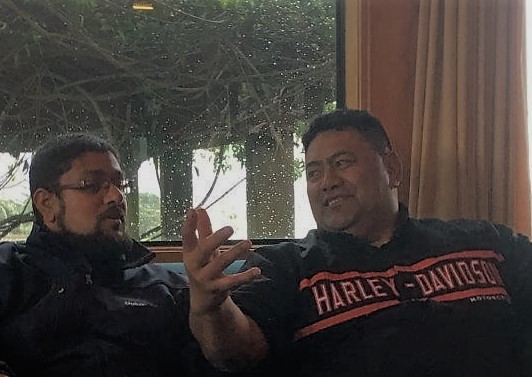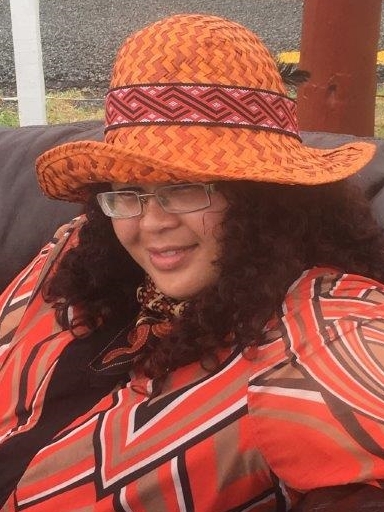An Anglican Retreat at Long Bay, north of Auckland seems an unlikely place for a recent weekend bikers’ hui, unless of course the bikers are White Ribbon Riders and the kaupapa is E Tū Whānau.

Bikers bring a great deal of laughter to the serious work of eliminating whanau violence. (R to L) Jackson August, Makere Rika-Heke, Lisa Smith and Tiki O’Brien
The 15 men and women who braved the wet spring weather to attend the hui belong to different bike clubs but ride together regularly. They come from all walks of life and professional backgrounds – social workers, prison guards, and lawyers ride alongside truck drivers, musicians and artists. They’re busy people who, at their own expense, give up their time to attend community events and rallies all over the country to highlight whānau wellbeing.Hui organiser, Sue Rudman from Bream Bay Community Trust and proud owner of a Honda Shadow 750, says she and her fellow bikers come together because they’re committed to their people and because they love each other.
“We’re social riders from different bike groups like the Patriots, Tribal National or Whānau Kotahi. We ride together because, first and foremost, we’re Māori and we’re passionate about doing everything we can to prevent family violence and transgressions of all kinds against whānau.”
“Besides,” she laughs, “we’re full of aroha for each other. We love hanging out together. “
“We live and breathe the stuff”

Eru Whare (R) with Vic, another of his biker whānau
Sue’s cousin Eru Whare was also at the hui.
“The E Tū Whānau values are my culture. It’s how I try to live. I come from Ngaruawahia where there is a strong influence. We live and breathe the stuff.”
Eru has been involved with E Tū Whānau for five years promoting the kaupapa and the E Tū Whānau Charter of Commitment on marae and at events and rallies throughout the North Island.
“From my experience of talking to whānau about the values and the Charter, I can confirm that E Tū Whānau is doing the right thing.”
“I talk to people about the Charter and they get it, because its concepts are simple and straight forward. It highlights values that are natural for our Māori people. The downside is that we don’t always practice them. That goes for me too.”
Eru gave up a busy job co-ordinating traffic for a large transport company and returned to truck driving, working nights so that he could spend more time on his community work. He sits on a number of boards and trusts and regularly visits schools to educate young people in the behaviours associated with suicide.
E Tū Whānau enhances mahi
“E Tū Whānau works in with, and enhances, my other mahi,” he says.
In his role as chair of the Pukerewa Marae committee, he knows he has an opportunity to exert a positive influence over his nieces and nephews.
“Our tamariki are really open to my kōrero around suicide prevention and they’re also open to the E Tū Whānau messages so I share them when I go into the schools. Kids are sponges and they will be the ones to take it into the next generation.”
The Long Bay gathering was the third time this particular group has come together to deepen their understanding of the movement’s values and its long term aim of ridding te Ao Māori of whānau violence. Makere Rika-Heke has attended all three.
Change comes from within

Makere Rika-Heke – “E Tū Whānau prods me to think about how I live…”
The joyful and always colourful Makere Rika-Heke.
“We’re all fallible. That’s what makes us human”.
Makere is an archaeologist in the Tirai unit of Heritage NZ’s Northern Regional office and has a strong professional, and personal, interest in the protection of Maori cultural values. She says the Long Bay hui looked in depth at the E Tū Whānau values and the Charter of Commitment and why they are so meaningful to individual Māori.
“E Tū Whānau appeals to me as a kaupapa because it prods me to think about how I live and how I can put my ideals into action. It makes me focus on how, and who, I want to be.
“We’re all fallible. We all slip off the radar every now and again. That’s what makes us human.
“E Tū Whānau encourages us to focus on the positive. It reminds us that change comes from within and it starts in our homes and in our whānau.”
“That’s why coming to hui like this and enjoying the camaraderie of like-minded people keeps me on track.”

